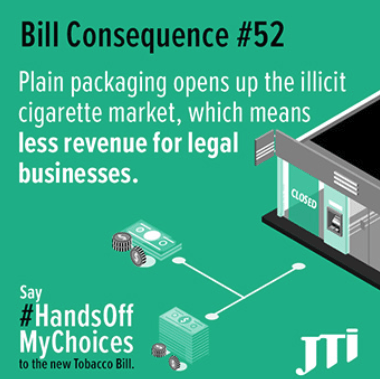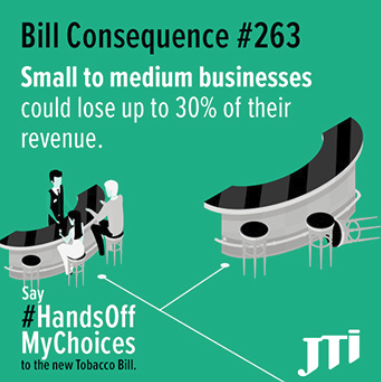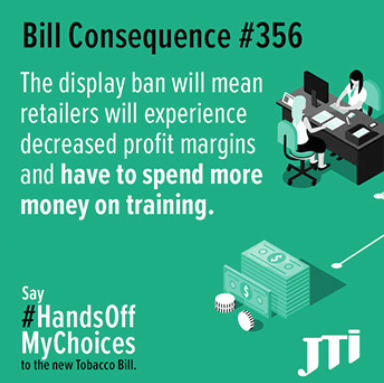South Africa: Industry Interference with the Control of Tobacco Products and Electronic Delivery Systems Bill
This page was last edited on at
On 9 May 2018, South Africa’s Minister of Health Aaron Motsoaledi invited public comment on the proposed Control of Tobacco Products and Electronic Delivery Systems Bill.1 The new Bill seeks to introduce plain packaging, remove designated smoking areas in restaurants, ban outdoor smoking in public areas, ban retailers displaying cigarettes and cigarette vending machines, and regulate e-cigarettes as tobacco products, among others.
The tobacco industry has used a variety of arguments and tactics to oppose the new draft Bill.23
Anti-Legislation Arguments: Same Story, Different Context
The tobacco industry has tried to create an impression that the proposed Bill will be detrimental to the South African economy, society and public health.
A peer-reviewed study by researchers from the University of Bath, showed that when faced with policy proposals aimed at reducing tobacco consumption, the tobacco industry’s overall discursive strategy is to exaggerate the potential costs of the proposed policy while simultaneously dismissing potential benefits, or denying them altogether.4
British American Tobacco South Africa (BATSA), in briefings to the Socio-Economic Impact Assessment (SEIA) commissioned by the Department of Health, has voiced the following main arguments:5
Smoke-Free Measures
- Costs have already been incurred by the hospitality industry to conform with existing legislation.
- There will be a loss of business and employment in the hospitality sector.
- Enforcement of smoke-free legislation will be costly.
Point-of-Sale Display Ban
- A point of sale display ban will lower cigarette prices which will lead to an increase in consumption and undermine the public health objective of reducing smoking.
- Costs will be incurred by retailers, impacting their profitability and reducing employment. Small retailers will be most adversely affected.
- A point of sale ban will increase illicit trade.
- Point of sale display bans will not actually reduce smoking prevalence.
Plain Packaging
- The policy will result in an increase in the illicit trade of tobacco products. Also see: Countering Industry Arguments Against Plain Packaging: It will Lead to Increased Smuggling
- It will decrease employment and tax revenues due to the expected increase in illicit trade.
- It will result in efficiency losses and a corresponding increased security risk in retailer operations, especially for small retailers. Also see: Countering Industry Arguments Against Plain Packaging: It will Cost Small Businesses
- The policy has no impact on smoking behaviour. Also see: Countering Industry Arguments Against Plain Packaging: No Evidence Plain Packaging Will Work
- The policy is unconstitutional and/or illegal. Also see: Countering Industry Arguments Against Plain Packaging: It Breaches Intellectual Property Rights
- It will lower cigarette prices leading to an increase in consumption and undermine the public health objective of reducing smoking.
The industry has unsuccessfully used many of these arguments to try undermine tobacco legislation in other parts of the world, including the Uganda Tobacco Control Bill 2014, and plain packaging legislation in Australia and the United Kingdom.
The University of Cape Town School of Economics’ Submission on the Draft Control of Tobacco Products and Electronic Delivery Systems Bill (July 2018) clearly and systematically debunks the tobacco industry’s economic arguments against the legislation.6 Also see: Countering Industry Arguments against Plain Packaging.
Building Coalitions
Another well-known tactic of the tobacco industry to oppose anti-tobacco legislation is to build coalitions to provide more credible platforms for the industry’s anti-legislation arguments. Once recruited, these more credible voices support the tobacco industry through lobbying, media agenda setting (thus swaying public opinion), promoting self-regulation, and weakening or fragmenting those that advocate the legislation.
Third Parties Active in the Policy Debate
Co-Opt the Media
Since 2017, Philip Morris International (PMI) has sponsored a series of workshops across Africa targeted at journalists, and promoting tobacco harm reduction and the view that the company’s e-cigarettes and heated tobacco products should be allowed to be marketed as a healthier alternative to smoking, despite the absence of a strong body of independent evidence to support this claim.7
South Africa’s new Bill is seeking to restrict the use of these products.
On 13 and 14 August 2018, a PMI-sponsored media workshop took place in Johannesburg.8 AllAfrica chair Amadou Mahta Ba and The Guardian Nigeria Editor-in-Chief Debo Adesigna were reportedly part of a PMI panel, as was Professor of Journalism Anton Harber.
The South African media workshop followed similar events in Kenya, Ivory Coast and Mali, which have been criticised as being part of a “continuation of its orchestrated misinformation campaign and attempt to ‘buy media influence’ and silence rising public support for effective tobacco control laws across Africa.”9
Mobilise Public Support

#HandsOffMyChoices Campaign
Following the announcement of the new draft Bill, Japan Tobacco International (JTI) launched the #HandsOffMyChoices campaign to mobilise the public into grassroot opposition. The campaign reiterated arguments voiced by BATSA, such as ‘it will increase illicit trade’ and ‘it will negatively impact retailers’ (images 1-3), but it’s main argument was that the Bill took away people’s freedom of choice and urged the public to protest against the Bill.10

Image 1

Image 2

Image 3
The campaign has used multiple channels of communication. In June 2018, JTI set up a website (handsoffmychoices.co.za) which urged the public to “fight for your choices” and sign an online petition against the Bill (Image 4).11 The campaign strongly featured the so-called ‘Nanny-state argument’, which promotes self-regulation and suggests that the government is treating adults like underage citizens who cannot be trusted to make their own lifestyle choices.12.1314 In August 2018 JTI paid for an advert to be broadcast on several radio stations across South Africa, with the slogan:15 “What if your loved one got put in jail because they smoke? It is just one step of the bill controlling your lifestyle choices. Join us in saying #HandOffMyChoices sic”
#TakeBackTheTax Campaign

In September 2018 it was reported that the Tobacco Institute of Southern Africa (TISA), the association that represents the interests of tobacco manufacturers, had paid social media influencers to promote a campaign called #TakeBackTheTax.16
TISA Chair Francois van der Merwe was quoted as saying that the social media influencers had “tweeted our adverts and the link to our website”. The website (takebackthetax.org, see image 5) encouraged the public to sign an online petition urging the South African government and law enforcement agencies to “act with urgency and take decisive steps in combating the trade in illegal cigarettes”.17
Campaign adverts were also published in newspapers, including the Mail & Guardian, and have made claims that the tax collected from the sale of legal cigarettes could go towards building 127 000 new homes, recruiting 52 000 new anti-corruption investigators, and solving the country’s electricity crisis.
The main argument promoted by the campaign is that illicit trade annually costs South Africa R7 billion in lost tax revenue, and that if the country curbed illicit trade, VAT would not have to be increased as it did in April 2018 (from 14% to 15%). While an independent calculation of lost tax revenue has not been done, an academic of the University of Cape Town’s School of Economics has suggested that TISA’s R7 billion calculation is flawed since less people would smoke if they were paying for more expensive, tax-paid cigarettes.
TobaccoTactics Resources
- South Africa- Country Profile
- British American Tobacco
- British American Tobacco in Africa: A History of Double Standards
- Philip Morris International
- Free Market Foundation (FMF)
- National African Federated Chamber of Commerce and Industry (NAFCOC)
- Countering Industry Arguments against Plain Packaging
- Countering Industry Arguments Against Plain Packaging: The Nanny State is going Too Far
TCRG Research
- Framing the policy debate over tobacco control legislation and tobacco taxation in South Africa, ZatońskiMZ, Egbe CO, Robertson L, et al., Tobacco Control, published online 25 November 2021. doi: 1136/tobaccocontrol-2021-056675
For a comprehensive list of all TCRG publications, including TCRG research that evaluates the impact of public health policy, go to the Bath TCRG’s list of publications.